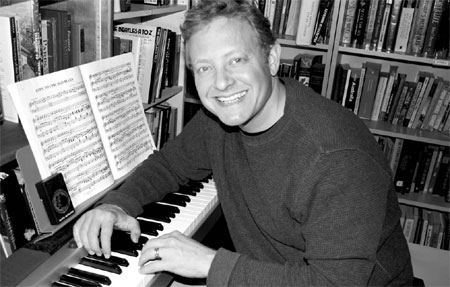A milieu of his own
By Mike Peters ( China Daily ) Updated: 2014-03-02 07:49:14
|
Andrew Field's fascination with Chinese pop music and the revival of "golden age" music from 1930s Shanghai has fueled his doctoral dissertation and two books. Photos Provided to China Daily |
He also learned many Japanese pop and folk songs, and practiced singing them at karaoke - where he also learned many songs from Taiwan and the Chinese mainland.
Excited by Chinese pop music and the revival of "golden age" music from 1930s Shanghai, he shaped those interests into a PhD dissertation focused on the song-and-dance industry of the early 20th century in China.
In 2007, he began work on a film documentary, Down, about the capital's indie rock scene.
Several years later, Field launched Shanghai's Dancing World at the Shanghai Literary Festival.
"In the '30s, people really went out to dance - they dressed up and they knew how," he says, laughing. Today, most of the clubs - even the best ones - are about selling drinks, and the once-de rigueur dance floors have given way to bar seating. His favorite hangouts for music include the House of Blues & Jazz, the Cotton Club, the JZ club and 288 Melting Pot - but only the oldest, the House of Blues & Jazz, still has a dance floor that sees any fancy steppin'.
A lot of the appeal is nostalgic, he says, noting that the Old Jazz Band at the Fairmont Peace Hotel has played there for decades.
"Today, the happening dance scene is the salsa clubs," he says.
Field's interest in the city's 1930s urban culture, meanwhile, led him to look closely at Mu Shiying one of the first significant Chinese writers who didn't focus on the proletariat countryside.
"He was once described as Shanghai's 'literary comet', starkly revealing the alienation of the cosmopolitan-capitalist city trapped between the forces of civilization and barbarism," Field says.
But the avant-garde writer was so apolitical that he eventually took a job with the Japanese occupiers of the city. He was assassinated on the street in 1940, though the who and why behind the killing isn't clear even today.
"Now there's a Mu craze after he was rediscovered in the '80s and '90s," Field says. "His highly original stream-of-consciousness approach to short-story writing deserves to be re-examined and re-read." Field's new book Mu Shiying: China's Lost Modernist, debuts at literary festivals this spring and includes six translations of his short stories.
IF YOU GO
- Noon-2pm, March 9. Bookworm Literary Festival, Bookworm, Beijing.
- Noon-2pm, March 12, Shanghai Literary Festival, M on the Bund, Shanghai.
- 4-6 pm, March 16. Bookworm Literary Festival, Bookworm, Suzhou.
- 7-9 pm, April 3. Wooden Box Cafe, Shanghai.
|
|
|
|
|
|
|
|






















 Raymond Zhou:
Raymond Zhou: Pauline D Loh:
Pauline D Loh: Hot Pot
Hot Pot Eco China
Eco China China Dream
China Dream China Face
China Face





